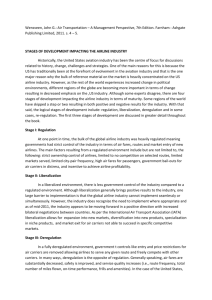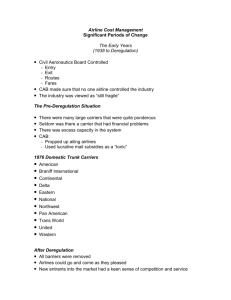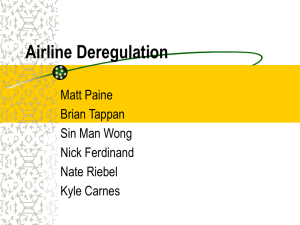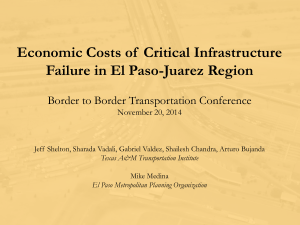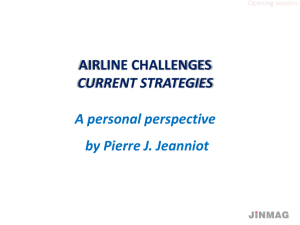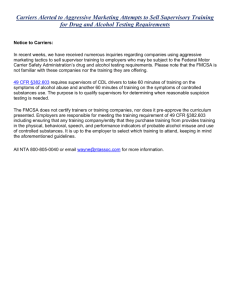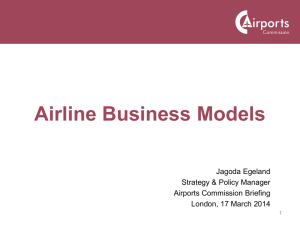(U.S. Supreme Court).
advertisement
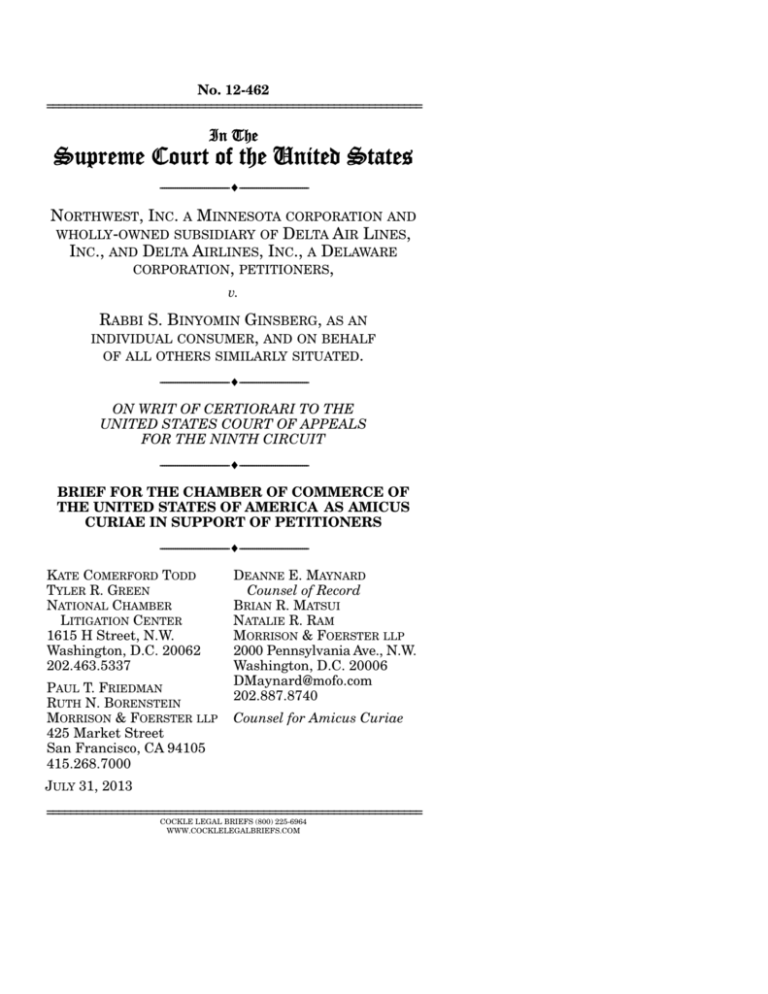
No. 12-462 ================================================================ In The Supreme Court of the United States ------------------------------------------------------------------ NORTHWEST, INC. A MINNESOTA CORPORATION AND WHOLLY-OWNED SUBSIDIARY OF DELTA AIR LINES, INC., AND DELTA AIRLINES, INC., A DELAWARE CORPORATION, PETITIONERS, v. RABBI S. BINYOMIN GINSBERG, AS AN INDIVIDUAL CONSUMER, AND ON BEHALF OF ALL OTHERS SIMILARLY SITUATED. -----------------------------------------------------------------ON WRIT OF CERTIORARI TO THE UNITED STATES COURT OF APPEALS FOR THE NINTH CIRCUIT -----------------------------------------------------------------BRIEF FOR THE CHAMBER OF COMMERCE OF THE UNITED STATES OF AMERICA AS AMICUS CURIAE IN SUPPORT OF PETITIONERS -----------------------------------------------------------------KATE COMERFORD TODD TYLER R. GREEN NATIONAL CHAMBER LITIGATION CENTER 1615 H Street, N.W. Washington, D.C. 20062 202.463.5337 PAUL T. FRIEDMAN RUTH N. BORENSTEIN MORRISON & FOERSTER LLP 425 Market Street San Francisco, CA 94105 415.268.7000 DEANNE E. MAYNARD Counsel of Record BRIAN R. MATSUI NATALIE R. RAM MORRISON & FOERSTER LLP 2000 Pennsylvania Ave., N.W. Washington, D.C. 20006 DMaynard@mofo.com 202.887.8740 Counsel for Amicus Curiae JULY 31, 2013 ================================================================ COCKLE LEGAL BRIEFS (800) 225-6964 WWW.COCKLELEGALBRIEFS.COM TABLE OF CONTENTS Page TABLE OF AUTHORITIES ................................. iii BRIEF FOR THE CHAMBER OF COMMERCE OF THE UNITED STATES OF AMERICA AS AMICUS CURIAE IN SUPPORT OF PETITIONERS ......................................................... 1 INTEREST OF AMICUS CURIAE ...................... 1 INTRODUCTION AND SUMMARY OF ARGUMENT.......................................................... 3 ARGUMENT ........................................................ 4 A. The Ninth Circuit’s Ruling Undermines Preemption Principles And Resurrects A Burdensome Patchwork Of State Regulation ............................................................. 4 1. Under Wolens, airlines face only routine breach-of-contract claims ............. 5 2. Plaintiffs could resurrect a variety of preempted claims under the rubric of good faith and fair dealing .................. 6 3. Allowing implied covenant claims would result in a patchwork of state regulation ............................................ 10 B. If Not Reversed, The Ninth Circuit’s Ruling Would Threaten Other Established Preemption Regimes, Including The FAAAA ................................................ 12 1. The cargo transportation industry illustrates the potential deleterious effects of the Ninth Circuit’s rationale.... 12 ii TABLE OF CONTENTS – Continued Page a. The FAAAA contains nearly identical preemptive language to the ADA ................................................ 13 b. The FAAAA has fostered nationally uniform practices and conditions that have benefitted businesses and consumers ................................ 14 c. Implied covenant claims would undermine these nationally uniform procedures and terms ............ 21 2. Comparable harms could arise in other contexts ................................................ 23 CONCLUSION..................................................... 25 iii TABLE OF AUTHORITIES Page CASES American Airlines, Inc. v. Wolens, 513 U.S. 219 (1995) ............................................................... passim Automatic Sprinkler Corp. of Am. v. Anderson, 257 S.E.2d 283 (Ga. 1979) ......................................10 Bates v. Dow Agrosciences LLC, 544 U.S. 431 (2005) .......................................................................24 Buck v. American Airlines, Inc., 476 F.3d 29 (1st Cir. 2007) ............................................................9 Cerdant, Inc. v. DHL Express (USA), Inc., No. 08-CV-186, 2009 U.S. Dist. LEXIS 27070 (S.D. Ohio Mar. 30, 2009) .......................................22 Continental Potash, Inc. v. Freeport-McMoran, Inc., 858 P.2d 66 (N.M. 1993)..................................10 Dalton v. Educational Testing Serv., 663 N.E.2d 289 (N.Y. 1995) ........................................... 11 Data Mfg., Inc. v. United Parcel Serv., Inc., 557 F.3d 849 (8th Cir. 2009) ..........................................13 Federal Express Corp. v. California Pub. Utils. Comm’n, 936 F.2d 1075 (9th Cir. 1991) ...... 17, 18, 19 Feldman v. UPS, No. 06-CV-2490, 2008 U.S. Dist. LEXIS 30637 (S.D.N.Y. Mar. 17, 2008) .........22 Haley Hill Designs, LLC v. UPS, Inc., No. 09CV-4212, 2009 U.S. Dist. LEXIS 109512 (C.D. Cal. Nov. 23, 2009) .........................................22 Hobin v. Coldwell Banker Residential Affiliates, Inc., 744 A.2d 1134 (N.H. 2000) .....................10 iv TABLE OF AUTHORITIES – Continued Page McMullen v. Delta Air Lines, Inc., 361 F. App’x 757 (9th Cir. 2010) ....................................................9 McMullen v. Delta Air Lines, Inc., No. 08-CV1523, 2008 U.S. Dist. LEXIS 75720 (N.D. Cal. Sept. 30, 2008), aff ’d, 361 F. App’x 757 (9th Cir. 2010) ...........................................................9 Moffitt v. JetBlue Airways Corp., No. 11-CV1387, 2012 U.S. Dist. LEXIS 50974 (N.D.N.Y. Apr. 5, 2012) ....................................................8, 9, 10 Morales v. Trans World Airlines, Inc., 504 U.S. 374 (1992) ........................................................ passim New Hampshire Motor Transp. Ass’n v. Rowe, 448 F.3d 66 (1st Cir. 2006), aff ’d, 552 U.S. 364 (2008) ................................................................16 Riegel v. Medtronic, Inc., 552 U.S. 312 (2008) .....23, 24 Rowe v. New Hampshire Motor Transp. Ass’n, 552 U.S. 364 (2008) ....................................... 5, 13, 14 Samica Enters., LLC v. Mail Boxes Etc. USA, Inc., 637 F. Supp. 2d 712 (C.D. Cal. 2008), aff ’d, 460 F. App’x 664 (9th Cir. 2011), cert. denied, 133 S. Ct. 123 (2012) .................................. 11 Shoney’s LLC v. MAC East, LLC, 27 So. 3d 1216 (Ala. 2009) ......................................................10 Smith v. Grand Canyon Expeditions Co., 84 P.3d 1154 (Utah 2003) ............................................. 11 Steiner v. Thexton, 226 P.3d 359 (Cal. 2010) .............10 v TABLE OF AUTHORITIES – Continued Page United Parcel Serv., Inc. v. Flores-Galarza, 318 F.3d 323 (1st Cir. 2003) ...........................................15 Wilson v. Amerada Hess Corp., 773 A.2d 1121 (N.J. 2001) ............................................................... 11 STATUTES 49 U.S.C. § 14501(c)(1) ...............................................13 49 U.S.C. § 41713(b)(4)(A) ..........................................13 Pub. L. No. 103-305, § 601(a)(1)(A)-(B), 108 Stat. 1569 (1994) .....................................................14 OTHER AUTHORITIES Bob Driehaus, DHL Inaugurates Final Piece of Cincinnati Northern Kentucky Airport (CVG) Expansion, KyPost.com (June 14, 2013) ................15 Claudia H. Deutsch, Still Brown, But Going High Tech, N.Y. Times, July 12, 2007 ....................19 DHL Express Terms and Conditions of Carriage ............................................................. 16, 19, 20 FedEx, Annual Report 2012 .......................................15 FedEx Express Terms and Conditions..... 16, 17, 19, 20 Glenn Morgan, Peer Hull Kristensen & Richard Whitley, The Multinational Firm: Organizing Across Institutional and National Divides (2001) .........................................................20 H.R. Conf. Rep. No. 103-677 ......................................14 vi TABLE OF AUTHORITIES – Continued Page John McPhee, Uncommon Carriers (2006) ..........15, 18 Kathy Woods, UPS Targeted in Class Action Suit, Legal Newsline (Feb. 8, 2010) .......................21 Matthew Heller, UPS Customers Press 9th Circ. To Revive Overcharge Case, Law360 (Apr. 9, 2013) ...........................................................21 UPS, 2012 Annual Report, Form 10-K ......................14 UPS Tariff/Terms and Conditions of Service— United States .................................. 16, 17, 18, 19, 20 BRIEF FOR THE CHAMBER OF COMMERCE OF THE UNITED STATES OF AMERICA AS AMICUS CURIAE IN SUPPORT OF PETITIONERS The Chamber of Commerce of the United States of America respectfully submits this brief as amicus curiae in support of petitioners.1 INTEREST OF AMICUS CURIAE The Chamber of Commerce of the United States of America (Chamber) is the world’s largest federation of business companies and associations. It directly represents 300,000 members and indirectly represents the interests of over 3 million business, trade, and professional organizations of every size, in every business sector, and from every region of the country. A central function of the Chamber is to represent the interests of its members in important matters before the courts, Congress, and the Executive Branch. To that end, it regularly files briefs as amicus curiae, both in this Court and in other courts, in cases raising issues of vital concern to the business community. 1 Petitioners filed a letter with the Clerk of the Court providing blanket consent to the filing of amicus briefs pursuant to Rule 37.3(a). A letter from counsel for respondent consenting to the filing of this brief has been filed with the Clerk of the Court. No counsel for a party authored this brief in whole or in part, and no party or counsel for a party made a monetary contribution intended to fund the preparation or submission of the brief. No person other than amici curiae, their members, or their counsel made a monetary contribution to the preparation or submission of this brief. 2 The Chamber files this brief to address the Ninth Circuit’s fundamental misapplication of preemption principles. By permitting respondent to pursue a claim for breach of an implied covenant of good faith and fair dealing, the Ninth Circuit wrongly opened a backdoor around the preemption scheme established by Congress. If not corrected, that misguided decision will harm the airline industry upon which our Nation’s economy depends. More broadly, the rationale of the Ninth Circuit places other preemption schemes at risk by inviting plaintiffs to re-frame claims as ones for breach of an implied covenant. 3 INTRODUCTION AND SUMMARY OF ARGUMENT The Ninth Circuit’s ruling creates an end run around preemption that threatens to undermine the efficient operation of the national economy. The Ninth Circuit’s ruling allows states to do through claims for breach of implied-by-law covenants what they cannot do through regulation. The Ninth Circuit has allowed a private plaintiff to enforce state policies that would enlarge or enhance an airline’s self-imposed contractual obligations. But such claims are contrary to Congress’s determination in the Airline Deregulation Act (ADA) that the airline industry functions best when its prices, routes, and services are governed solely by uniform national laws. If not reversed, the decision below would subject airlines to a panoply of claims based on state judges’ and juries’ views of whether the airlines had acted with sufficient “good faith” and “fair dealing.” But this Court’s decision will have implications beyond frequent flyer programs and beyond airlines. The Ninth Circuit’s rationale threatens other preemption schemes as well. For one, this Court’s ruling undoubtedly will be applied to the scope of the Federal Aviation Administration Authorization Act of 1994 (FAAAA). That statute uses nearly identical preemption language to free the cargo transportation industry from a patchwork of state laws. 4 With the benefit of FAAAA preemption, national and regional cargo carriers have created uniform, cost-effective, and efficient transportation networks throughout the United States. Implied covenant claims could resurrect a patchwork of state law obligations Congress intended to eliminate. In the end, businesses and consumers would be harmed as carriers would no longer enjoy the efficiencies of uniformity, would be unable to provide as many options, and would have to charge higher prices. It takes little imagination to foresee the same end run around preemption statutes applied to other preemptive schemes. Such enforcement of myriad states’ policies through implied covenant claims would be antithetical to the very notion of federal preemption. And it would harm the national economy. ARGUMENT A. The Ninth Circuit’s Ruling Undermines Preemption Principles And Resurrects A Burdensome Patchwork Of State Regulation The Ninth Circuit’s ruling opens a backdoor to state regulation that the ADA, by its express terms, closed shut. If not reversed, that ruling would revive the very patchwork of regulation that Congress precluded. 5 1. Under Wolens, airlines face only routine breach-of-contract claims Congress enacted the ADA preemption provision to ensure that states did not interfere with federal deregulation of the airline industry. “Congress ‘determin[ed] that maximum reliance on competitive market forces’ would favor lower airline fares and better airline service.” Rowe v. New Hampshire Motor Transp. Ass’n, 552 U.S. 364, 367 (2008) (quoting Morales v. Trans World Airlines, Inc., 504 U.S. 374, 378 (1992)). This Court held in Wolens that the ADA permits only the enforcement of an airline’s “self-imposed undertakings” through “routine breach-of-contract claims.” American Airlines, Inc. v. Wolens, 513 U.S. 219, 228, 232-233 (1995). In adjudicating such claims, the ADA confines courts “to the parties’ bargain, with no enlargement or enhancement based on state laws or policies external to the agreement.” Id. at 233. As this Court explained, “[a] remedy confined to a contract’s terms simply holds parties to their agreements—in this instance, to business judgments an airline made public about its rates and services.” Id. at 229. In accordance with Wolens, airlines and their customers know that they can enforce the express terms of their contracts. Such contract enforcement is essential to the business of the Chamber’s members, as “[t]he stability and efficiency of the market depend fundamentally on the enforcement of agreements 6 freely made, based on needs perceived by the contracting parties at the time.” Id. at 230 (internal quotation marks omitted). Yet the Ninth Circuit’s decision in this case goes beyond the enforcement of self-imposed undertakings. It exposes airlines to liability based on extracontractual duties and policies imposed by state law. Exempting claims for breach of an implied covenant of good faith and fair dealing from ADA preemption would subject airlines to a wide variety of claims based on state standards of good faith, reasonableness, and fairness that Congress preempted. Should this Court permit implied covenant claims to evade preemption, airlines will be subject to far more than the mere inconvenience of litigation. Rather, amorphous and expansive implied covenant claims would significantly impact carrier prices and services, and correspondingly affect businesses and consumers. If not reversed, the Ninth Circuit’s decision threatens to erode the benefits that ADA preemption has provided to airlines and their customers. That result would cause corresponding harms to the economy. 2. Plaintiffs could resurrect a variety of preempted claims under the rubric of good faith and fair dealing By its nature, an implied covenant of good faith and fair dealing is not an express, self-imposed undertaking; it is implied into a contract based on state policy expressed through common law. Such implied duties may differ from, or may not be found in, the 7 express terms of the agreement. Here, respondent invoked an implied covenant to restrict an airline’s contractual right to determine “in its sole judgment” whether to terminate respondent’s frequent flyer status for abusing the program. Pet. App. 4a. Respondent’s claim is not that the airline breached its contract. Instead, the claim is that state policy precludes the airline from exercising its express contractual right unless the airline satisfies state policy as to good faith and fair dealing. In Morales, this Court addressed similar restrictions on frequent flyer programs contained in the National Association of Attorneys General (NAAG) Air Travel Industry Enforcement Guidelines. 504 U.S. at 379, 407-417 (Appendix). The NAAG Guidelines addressed how airlines could “reserve [the] right” to change frequent flyer programs “by adequately providing” notice consistent with state law. The Guidelines included “acceptable” approaches to changing programs “without unreasonably altering the rights and expectations of vested members.” And they required a “reasonable” period after notice before changes could take place. Id. at 408, 410, 413 (comments to Sections 3, 3.1, 3.2). As this Court noted in Wolens, those guidelines “highlight the potential for intrusive regulation of airline business practices inherent in state consumer protection legislation,” including by “instruct[ing] airlines on language appropriate to reserve rights to alter frequent flyer programs.” 513 U.S. at 227-228. 8 Morales and Wolens both make clear that such guidelines cannot be enforced through a claim under state consumer laws. However, respondent’s claim for breach of an implied covenant of good faith and fair dealing would achieve the same prohibited result. Respondent asserts that the implied covenant “precludes any action . . . that would contravene [his] reasonable expectations.” J.A. 51-52. And he seeks compensation for “the lost benefits, rights and privileges” of his program membership status. Ibid. Thus, although respondent could not use state consumer protection laws to hold petitioners liable for allegedly revoking his frequent flyer status contrary to his reasonable expectations, he invokes state policy encompassed in the implied covenant to achieve the same result. See Moffitt v. JetBlue Airways Corp., No. 11-CV-1387, 2012 U.S. Dist. LEXIS 50974, at *16 (N.D.N.Y. Apr. 5, 2012) (characterizing airline passengers’ implied covenant claim as “functionally indistinguishable from [their] statutory unfair and deceptive practice claim”). Allowing this claim to escape preemption would invite the repleading of all manner of preempted state-law claims as alleged breaches of good faith and fair dealing. These concerns are real. Implied covenant suits have been filed against airlines in attempts to alter various types of contractual prices and services. For example, airline contracts may provide that certain tickets are nonrefundable. Yet passengers who purchased nonrefundable tickets have asserted implied covenant claims when the airline failed to given them 9 any money back on their unused tickets. The passengers claimed the airline breached the implied covenant by retaining fees and taxes the airline collected in connection with their tickets without first providing adequate notice that the airline would do so. Buck v. American Airlines, Inc., 476 F.3d 29, 31-32 (1st Cir. 2007). Implied covenant suits even have challenged the manner in which airlines calculate their fees. For example, airline contracts may require that taxes be collected from all passengers and provide a mechanism for exempt passengers to obtain a refund. See McMullen v. Delta Air Lines, Inc., 361 F. App’x 757, 758 (9th Cir. 2010). Yet rather than seek a refund, see ibid., plaintiffs have brought suits claiming that an airline breached the implied covenant by not correctly “determin[ing] which taxes, fees, and surcharges were actually due for each passenger” and then retaining taxes collected from exempt passengers. McMullen v. Delta Air Lines, Inc., No. 08-CV-1523, 2008 U.S. Dist. LEXIS 75720, at *2-3 (N.D. Cal. Sept. 30, 2008), aff ’d, 361 F. App’x 757 (9th Cir. 2010). In effect, such implied covenant claims have demanded that airlines determine which passengers are not required to pay a particular tax and charge those customers accordingly. And airline passengers diverted and delayed due to heavy winter storms have clothed state law claims against deceptive business practices in the language of the implied covenant of good faith and fair dealing. Moffitt, 2012 U.S. Dist. LEXIS 50974, at *16-17. 10 These implied covenant claims are “functionally indistinguishable” from the statutory claims Morales and Wolens have forbidden. Id. at *16. Claims alleging breach of the implied covenant of good faith and fair dealing thus seek to impose myriad and varied additional terms on existing contracts. Exempting such claims from preemption, as the Ninth Circuit did in the decision below, would swallow the rule that “stops States from imposing their own substantive standards with respect to rates, routes, or services.” Wolens, 513 U.S. at 232. Congress has determined that the imposition of such state standards is inefficient and harms the national economy. 3. Allowing implied covenant claims would result in a patchwork of state regulation Enforcement of claims for breach of an implied covenant of good faith and fair dealing would give rise to a patchwork of state-imposed, extra-contractual obligations. To be sure, many states reject implied covenant claims where the alleged good faith obligations are inconsistent with the contract’s terms. See, e.g., Steiner v. Thexton, 226 P.3d 359, 365 (Cal. 2010); Shoney’s LLC v. MAC East, LLC, 27 So. 3d 1216, 1223 (Ala. 2009); Hobin v. Coldwell Banker Residential Affiliates, Inc., 744 A.2d 1134, 1137-1139 (N.H. 2000); Continental Potash, Inc. v. Freeport-McMoran, Inc., 858 P.2d 66, 82-83 (N.M. 1993); Automatic Sprinkler Corp. of Am. v. Anderson, 257 S.E.2d 283, 284 (Ga. 1979). Yet other states nonetheless impose good faith 11 and fair dealing obligations that limit, or even contradict, express terms in contracts. See, e.g., Smith v. Grand Canyon Expeditions Co., 84 P.3d 1154, 1159 (Utah 2003); Wilson v. Amerada Hess Corp., 773 A.2d 1121, 1129-1130 (N.J. 2001); Dalton v. Educational Testing Serv., 663 N.E.2d 289, 291-292 (N.Y. 1995). The common law nature of implied covenant claims would exacerbate this patchwork still further. These amorphous and expansive claims can depend on the individual judge or jury examining the claim. Each judge and each jury would be permitted to decide what “good faith” and “fair dealing” require, potentially leading to a patchwork of applications and inconsistent results. As one court observed in finding an implied covenant claim preempted, allowing such a claim would interpose an obligation to act “reasonably” in exercising discretionary authority expressly reserved under a contract. See Samica Enters., LLC v. Mail Boxes Etc. USA, Inc., 637 F. Supp. 2d 712, 720 (C.D. Cal. 2008), aff ’d, 460 F. App’x 664 (9th Cir. 2011), cert. denied, 133 S. Ct. 123 (2012). Thus, the scope of what is “reasonable” may vary from jury to jury, court to court, and state to state. A national carrier would be unable to know ahead of time whether a particular exercise of its expressly reserved contractual discretion would be found “unreasonable” or “unfair.” Depending upon the particular vagaries of the state common law, implied duties can fundamentally alter the scope of the agreement. And uniform terms 12 and conditions will no longer mean the same thing. Instead, they will depend on where a plaintiff brings suit. That result is precisely what Congress sought to prevent in enacting the ADA. And it runs directly counter to what this Court held in Morales and Wolens. Wolens, 513 U.S. at 233; Morales, 504 U.S. at 378. B. If Not Reversed, The Ninth Circuit’s Ruling Would Threaten Other Established Preemption Regimes, Including The FAAAA The Ninth Circuit’s end run around the ADA’s express preemption provision threatens to erode other preemption schemes enacted by Congress. The harms to the economy from the Ninth Circuit’s errant view thus could extend across multiple industries. This is most easily seen from the application of this Court’s ruling to the analogous preemption provision of the FAAAA. Dismantling the preemption schemes that govern the airline and cargo transportation industries alone would have devastating effects on the economy. But there is no principle that would cabin the Ninth Circuit’s ruling solely to those key industries. 1. The cargo transportation industry illustrates the potential deleterious effects of the Ninth Circuit’s rationale If the Ninth Circuit’s ruling is not reversed, the effects undoubtedly will be felt by the Nation’s commercial air, motor, and intermodal (i.e., air and ground) cargo and package delivery carriers. 13 a. The FAAAA contains nearly identical preemptive language to the ADA The FAAAA contains preemptive language nearly identical to that in the ADA: “a State, political subdivision of a State, or political authority of 2 or more States may not enact or enforce a law, regulation, or other provision having the force and effect of law related to a price, route, or service of any motor carrier . . . with respect to the transportation of property.” 49 U.S.C. § 14501(c)(1); see id. § 41713(b)(4)(A) (same with respect to “air carrier or carrier affiliated with a direct air carrier through common controlling ownership when such carrier is transporting property by aircraft or by motor vehicle”). In enacting the FAAAA, Congress “copied the language of the air-carrier pre-emption provision of the Airline Deregulation Act.” Rowe, 552 U.S. at 370. In doing so, it was “fully aware of this Court’s interpretation of that language as set forth in Morales.” Ibid. Accordingly, this Court has applied its ADA authorities to determine the scope of the FAAAA. Ibid. (“we follow Morales in interpreting similar language” in the FAAAA). Lower courts likewise have applied this Court’s ADA authorities, including Wolens, to the FAAAA. See, e.g., Data Mfg., Inc. v. United Parcel Serv., Inc., 557 F.3d 849, 853 (8th Cir. 2009). Through the FAAAA, Congress sought to eliminate a patchwork of state regulation that was “caus[ing] significant inefficiencies, increased costs, 14 reduction of competition, inhibition of innovation and technology and [was] curtail[ing] the expansion of markets.” H.R. Conf. Rep. No. 103-677, at 87. This “sheer diversity” of state regulation was a “huge problem for national and regional carriers attempting to conduct a standard way of doing business.” Ibid. As Congress recognized, cargo carriers frequently transported packages across state lines and back just to avoid regulations that applied to intrastate packages. Id. at 87-88. Congress’s express findings in the FAAAA explain that state laws and regulations affecting carriers “imposed an unreasonable burden on interstate commerce [and] impeded the free flow of trade, traffic, and transportation of interstate commerce” across the Nation. Pub. L. No. 103-305, § 601(a)(1)(A)-(B), 108 Stat. 1569, 1605 (1994). b. The FAAAA has fostered nationally uniform practices and conditions that have benefitted businesses and consumers As Congress intended, FAAAA preemption has fostered the “competitive market forces” and innovation necessary for the development of a national cargo transportation industry that can handle the Nation’s massive volume of shipments. Rowe, 552 U.S. at 371. Last year, UPS alone delivered 4.1 billion packages— or roughly 16.3 million packages a day.2 FedEx likewise delivered, on average, more than 7.6 million 2 UPS, 2012 Annual Report, Form 10-K, at 1, available at http://tinyurl.com/n8dyd8e. 15 packages each day.3 And DHL processed 150,000 packages each day at its “super hub” near Cincinnati, Ohio, a volume that accounts for eighty percent of all DHL shipments in the Western hemisphere.4 Relying on Congress’s mandate in the FAAAA, carriers have implemented extensive, integrated transportation and package-handling networks to process these millions of packages a day. Carriers and their customers “depend upon an orderly flow of packages.” United Parcel Serv., Inc. v. FloresGalarza, 318 F.3d 323, 336 (1st Cir. 2003); see John McPhee, Uncommon Carriers 164 (2006). The carriers’ networks use uniform procedures and processes that do not vary simply because an airplane or a truck crosses a state line. Indeed, they cannot do so. Any variation can cause disruptions that might send ripple effects throughout the entire transportation network. Any disruption at any point in these operations, no matter how seemingly minor it might appear to be, can adversely affect the delivery of thousands of packages in transit. A delay of just a few minutes in sorting and loading can cause UPS to miss guaranteed delivery commitments for every package loaded at a given 3 FedEx, Annual Report 2012, at 12, available at http://tinyurl. com/kxc54n8. 4 Bob Driehaus, DHL Inaugurates Final Piece of Cincinnati Northern Kentucky Airport (CVG) Expansion, KyPost.com (June 14, 2013), http://tinyurl.com/n76rby5. 16 UPS facility. See New Hampshire Motor Transp. Ass’n v. Rowe, 448 F.3d 66, 70 (1st Cir. 2006), aff ’d, 552 U.S. 364 (2008). FAAAA preemption also allows carriers to operate under uniform terms, without having to comply with myriad state restrictions regarding the content of the terms or methods of disclosure.5 These uniform terms create certainty for businesses, consumers, and the carriers themselves as to what the contract requires. That certainty enables businesses and consumers to determine the express benefit of the bargain they are making, to know what the fees are, and—most importantly—to know by when their packages will be delivered. Certainty also enables carriers to maximize uniformity of operations and processes to fulfill their contractual obligations without fear of liability for claims beyond their express contractual obligations. Thus, terms and conditions, like everything else these carriers do, are designed to facilitate the timely, efficient, and low-cost transportation of packages nation- and world-wide. Carriers’ terms are designed 5 See, e.g., DHL Express Terms and Conditions of Carriage (“DHL Terms & Conditions”), at 1, available at http://www.dhl-usa. com/content/dam/downloads/g0/express/shipping/terms_condiitions/ international/terms_conditions_of_carriage_us_en.pdf; FedEx Express Terms and Conditions (“FedEx Terms & Conditions”), at 1, available at http://images.fedex.com/us/services/pdf/SG_TermsCond_US_ 2013.pdf; UPS Tariff/Term and Conditions of Service—United States (“UPS Tariff ”), at 1 § 1, available at http://www.ups.com/ media/en/terms_service_us.pdf. 17 to give carriers the flexibility they need to move massive volumes of goods while meeting delivery deadlines. To achieve these results, carrier contracts frequently reserve to one party or the other sole authority and responsibility for certain aspects of the transaction. For example, FedEx’s terms allow FedEx to “determine the routing of all shipments, including the mode of transportation used” and reserve to FedEx “the right to divert any shipment (including use of other carriers) in order to facilitate its delivery.”6 UPS similarly “reserves the right in its sole discretion to use any mode of transportation whatsoever to provide the service selected by the shipper. Regardless of the mode of transportation used, the effective UPS Rates for the service selected by the shipper shall apply.”7 Such reservations of discretion may be necessary to fulfill contractual obligations—i.e., to get the package delivered on time. Indeed, discretion over the mode of transportation often is crucial to achieve timely and costeffective delivery on the scale that national carriers operate. Conditions are constantly in flux: “Federal Express must be prepared to meet changing weather, mechanical breakdowns, and varying conditions at airports.” Federal Express Corp. v. California Pub. 6 FedEx Terms & Conditions, supra, at 12 (“Routing and Rerouting”). 7 UPS Tariff, supra, at 24 § 37. 18 Utils. Comm’n, 936 F.2d 1075, 1077 (9th Cir. 1991). Choice of the mode of transportation may be the determining factor for on-time delivery. “The system would not achieve its goal of certain, speedy service without backup equipment and alternative modes of transportation.” Ibid. Indeed, “the choice of one of the three modes of transportation . . . depends on air traffic, control delays, weather, aircraft availability, and the volume of packages in the entire system.” Ibid. The same is true at UPS, which operates its Air Service Center all night to monitor and respond to mechanical and other delays or difficulties in its world-wide network. McPhee, supra, at 183. Each night, the Air Service Center is populated with “dispatchers, meteorologists, crew schedulers, crew reschedulers, flight dispatchers, and global trackers. There were contingency people studying storms and choosing alternative routes.” Ibid. If “a UPS airplane anywhere in the world cannot take off for mechanical reasons or cannot function for any reason,” “a standby crew gets into a standby airplane and flies off to fill the gap.” Ibid. Thus, this discretion is critical for carriers to meet, and for businesses and consumers to receive, certain on-time delivery guarantees. For example, in its Tariff/Terms and Conditions of Service for the United States, UPS “guarantees on-schedule delivery” of nearly all packages, subject to certain exclusions 19 denominated in the Tariff.8 UPS will credit or refund shipping charges for packages for which it does not meet its service guarantee. FedEx makes a similar commitment.9 In other words, “[w]hen you handle millions of packages, a minute’s delay can cost a fortune[.]” Claudia H. Deutsch, Still Brown, But Going High Tech, N.Y. Times, July 12, 2007, at C1 (internal quotation marks omitted). Thus, if carriers are not permitted to exercise the discretion they are afforded in their contract to get a package delivered on time, carriers will not be able to offer (and businesses and consumers will not be able to receive) lowcost on time guarantees.10 8 See UPS Tariff, supra, at 31-33 § 48. See Federal Express Corp., 936 F.2d at 1077 (“Federal Express guarantees delivery by 10:30 a.m. the day after a package has been picked up. There is a full refund if a package is even one minute late. To keep this schedule, even the most minor delays must be avoided[.]”); FedEx Terms & Conditions, supra, at 9 (“Money-Back Guarantee Policy”). 10 Carriers have various other forms of contractual discretion. For example, carriers reserve the right in their sole discretion to open and inspect packages, which may be necessary to protect the safety of their employees and the public. See DHL Terms & Conditions, supra, at 2 § 4; FedEx Terms & Conditions, supra, at 7; UPS Tariff, supra, at 13 § 6. FedEx’s and UPS’s terms allow the carriers discretion to assess fuel and other surcharges. FedEx Terms & Conditions, supra, at 7; UPS Tariff, supra, at 26 § 38. These carriers’ terms also provide for efficiency in having businesses effectively “self-bill” for shipments by processing packages themselves. As a safeguard, the carriers reserve the right to adjust bills if they determine in their discretion that the reported shipment information was incorrect. (Continued on following page) 9 20 The carriers’ uniformity of operations, processes, and terms provides multiple benefits to carriers and their customers, both businesses and individual consumers. Having uniform procedures that emphasize efficiency keeps carriers’ overall costs down, and therefore affects the prices that carriers charge. Carriers and their customers also benefit from the certainty and uniformity of knowing the terms that apply to shipments regardless of the origin, destination, and routing for any package. For large businesses that ship from locations in multiple states, that uniformity allows for certainty not only in cost but also in terms that will apply to all shipments. As a result of FAAAA preemption, carriers can place their hubs, route their packages, and design their services based on the needs of their and their customers’ businesses, not state regulation. These are precisely the benefits Congress contemplated when it eliminated state regulation. Before the enactment of the FAAAA, integrated transportation services “were seriously hampered by regulatory constraints.” Glenn Morgan, Peer Hull Kristensen & Richard Whitley, The Multinational Firm: Organizing Across Institutional and National Divides 289 (2001). Nationwide and regional carriers had to implement different processes to comply with different laws and standards when they moved from one state or locality to another. Today, that is no longer the case. Carriers DHL Terms & Conditions, supra, at 2 § 5; FedEx Terms & Conditions, supra, at 3; UPS Tariff, supra, at 23 § 37. 21 compete with one another on the bases of price and service, as determined by their customer contracts. Any state law that would impose additional duties, terms, or conditions on those contracts—including limitations on the critical reservations of complete discretion afforded to the carriers—would undermine the uniformity upon which carriers and their customers depend. c. Implied covenant claims would undermine these nationally uniform procedures and terms All of this would be lost if, contrary to Congress’s expressed intent, state policies were once again applied to cargo carriers’ prices, routes, and services. Yet that would be the result if this Court were to adopt the Ninth Circuit’s rationale. These concerns are not fanciful. Such claims have been made to try to alter a carrier’s contractual obligations. For example, plaintiffs have alleged that good faith and fair dealing restricts a carrier’s discretion over the mode of transporting packages, insisting that they are entitled to pay less when a UPS Next Day Air® package is delivered by the guaranteed deadline without flying on an airplane. See Kathy Woods, UPS Targeted in Class Action Suit, Legal Newsline (Feb. 8, 2010), http://legalnewsline.com/news/ 225452-ups-targeted-in-class-action-suit; Matthew Heller, UPS Customers Press 9th Circ. To Revive Overcharge Case, Law360 (Apr. 9, 2013), http://tinyurl.com/km35egx. 22 Plaintiffs also have claimed that the implied covenant entitled them to refunds of charges notwithstanding their failure to comply with express contractual requirements governing refunds. Carriers may generate an invoice once a customer processes a shipment through a carrier’s online shipping system. If the customer subsequently decides not to ship that package, the carrier contracts require the customer to request a refund. Nonetheless, customers who never requested refunds have brought class actions claiming that carriers breached an implied covenant of good faith and fair dealing for not automatically refunding their charges. Haley Hill Designs, LLC v. UPS, Inc., No. 09-CV-4212, 2009 U.S. Dist. LEXIS 109512 (C.D. Cal. Nov. 23, 2009); Cerdant, Inc. v. DHL Express (USA), Inc., No. 08-CV-186, 2009 U.S. Dist. LEXIS 27070 (S.D. Ohio Mar. 30, 2009). Other implied covenant claims could obviate express limitations in a carrier’s contract. For example, cargo carriers often prohibit by contract shipments that exceed a specified value. But that does not stop plaintiffs from bringing implied covenant claims to hold a carrier liable for loss of an item that exceeded that limit. Feldman v. UPS, No. 06-CV2490, 2008 U.S. Dist. LEXIS 30637, at *5, *8 (S.D.N.Y. Mar. 17, 2008) (suing carrier for losing $57,000 of jewelry when contract prohibited shipping articles worth more than $50,000). Allowing good faith and fair dealing claims to evade preemption would eliminate the certainty that carriers and businesses have achieved through 23 preemption. Carriers and their customers would not know whether the express terms of their contracts would be honored or instead would be modified to conform to state law policies and norms. Rather than certainty and consistency, carriers and their customers may face different requirements based on the states in which shipments were picked up or delivered, or the views of a particular judge or jury. 2. Comparable harms could arise in other contexts The Ninth Circuit’s conclusion—that all claims sounding in state contract law necessarily survive ADA preemption—is untethered to any specific text in the ADA’s express preemption provision. Given that lack of a textual grounding, the Ninth Circuit’s reasoning could support efforts by others who might seek to evade preemption provisions outside the ADA and the similarly worded FAAAA. The reasoning of the decision below thus could permit plaintiffs to bring claims under a variety of open-ended implied covenants, or through other common law means that do not resemble traditional state regulation. But such maneuverings would contradict this Court’s repeated and clear pronouncements that broad federal preemption provisions (such as those in the ADA and FAAAA) apply with equal force to state legislative enactments, state regulations, and state common law. After all, common law duties are merely state regulation by a different name. See, e.g., Riegel v. Medtronic, Inc., 552 U.S. 312, 323-325 (2008) 24 (holding that the Medical Device Amendments of 1976, which preempts “any requirement[s]” of a state that are “different from, or in addition to, any requirement applicable under” the federal statute, preempted a state’s “common-law duties”); Bates v. Dow Agrosciences LLC, 544 U.S. 431, 435 (2005) (holding that a provision in the Federal Insecticide, Fungicide, and Rodenticide Act that prohibited states from “impos[ing] or continu[ing] in effect any requirements for labeling or packaging in addition to or different from those required” under the statute preempted common-law actions). Indeed, the Ninth Circuit’s notion that federal law preempts acknowledged regulations but not regulations disguised as “common law” obligations, such as implied covenants, makes little sense. Congress generally passes preemption provisions to eliminate multi-state, patchwork barriers to an industry’s ability to flourish in a national economy. The potential interference with such interstate economic activity from acknowledged state regulation—i.e., state legislation or regulation—would pale next to the interference certain to arise from applying the views of literally thousands of state court trial judges, and volumes more jurors, in actions governed by state common law. Manufacturers of certain medical devices, pesticides, and other products would have faced just such a patchwork of state common-law liability but for this Court’s holdings such as in Riegel and Bates. If not reversed, the Ninth Circuit’s judgment will lay the groundwork for future evasions of broad 25 federal preemption provisions in other contexts. That result would contravene both Congress’s desire to provide the certainty and predictability necessary for a robust national economy, and this Court’s prior precedents properly subjecting state common-law regulations to broad federal preemption provisions that give effect to Congress’s judgments. CONCLUSION For the foregoing reasons and those stated in petitioners’ brief, the judgment of the court of appeals should be reversed. Respectfully submitted, KATE COMERFORD TODD TYLER R. GREEN NATIONAL CHAMBER LITIGATION CENTER 1615 H Street, N.W. Washington, D.C. 20062 202.463.5337 PAUL T. FRIEDMAN RUTH N. BORENSTEIN MORRISON & FOERSTER LLP 425 Market Street San Francisco, CA 94105 415.268.7000 JULY 31, 2013 DEANNE E. MAYNARD Counsel of Record BRIAN R. MATSUI NATALIE R. RAM MORRISON & FOERSTER LLP 2000 Pennsylvania Ave., N.W. Washington, D.C. 20006 DMaynard@mofo.com 202.887.8740 Counsel for Amicus Curiae
